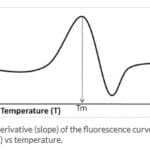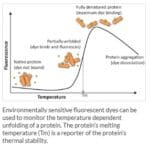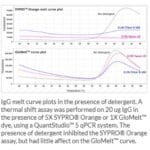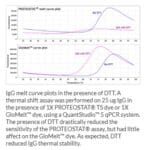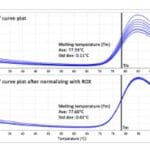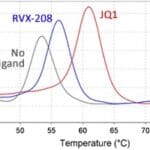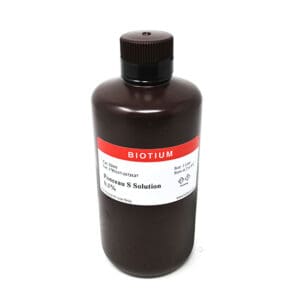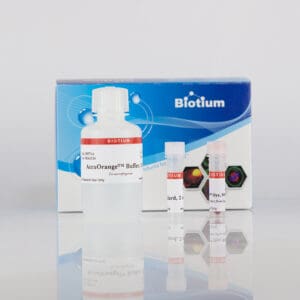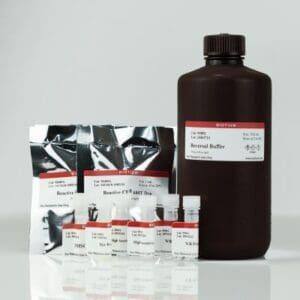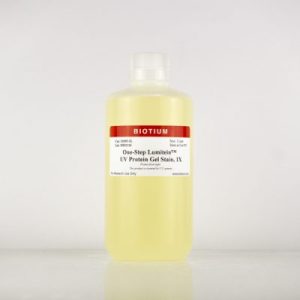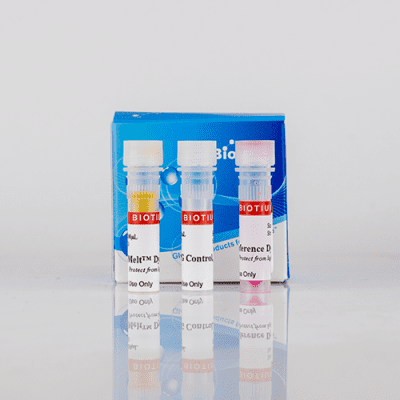
Kit for fluorescence-based measurement of protein unfolding or thermal stability in thermal shift assay, also called Protein Thermal Shift™, differential scanning fluorimetry, or Thermofluor assay.
| Name | SKU | Size | Availability | Vendor | Price | Order | |
GloMelt™ Thermal Shift Protein Stability Kit NO ROX |
33021-T | 200 assays (trial size) | Generally 1-2 weeks from receipt of order | Biotium | Log in for pricing | ||
GloMelt™ Thermal Shift Protein Stability Kit NO ROX |
33021-1 | 2000 assays | Generally 1-2 weeks from receipt of order | Biotium | Log in for pricing | ||
GloMelt™ Thermal Shift Protein Stability Kit with ROX |
33022-T | 200 assays (trial size) | Generally 1-2 weeks from receipt of order | Biotium | Log in for pricing | ||
GloMelt™ Thermal Shift Protein Stability Kit with ROX |
33022-1 | 2000 assays | Generally 1-2 weeks from receipt of order | Biotium | Log in for pricing |
The GloMelt™ Thermal Shift Protein Stability Kit is used to detect protein unfolding or measure thermal stability by performing a thermal shift assay, also called Protein Thermal Shift™, differential scanning fluorimetry, or Thermofluor assay.
Also view our GloMelt™ 2.0 Thermal Shift Protein Stability Kit which features a Recombinant Monoclonal Mouse IgG1 for performing control reactions. Compared to the polyclonal goat IgG control provided in the original GloMelt™ kit, the recombinant mouse antibody included in the GloMelt™ 2.0 Kit generates higher signal and a sharper melt peak between for robust assay validation.
Features
- Green fluorescence optimal for qPCR instruments and ROX normalization
- Compatible with high detergent concentrations
- Tolerates wide pH range, reducing agents, and common buffers/excipients
- Great for high-throughput assays, low reaction volumes, and low protein concentrations
- Highly soluble and stable in aqueous buffers
Kit Components
- GloMelt™ Dye, 200X
- Goat IgG Control, 10 mg/mL
- ROX Reference Dye, 40 uM (33022-T/33022-1 only)
Spectral Properties
- GloMelt™ Dye Ex/Em 468/507 nm
- ROX Reference Dye Ex/Em 575/600 nm
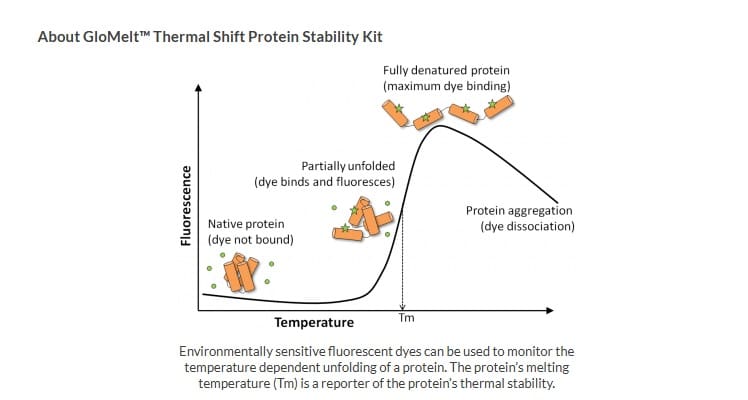
GloMelt™ dye undergoes fluorescence enhancement upon binding to hydrophobic regions of denatured proteins, and therefore can be used to detect protein unfolding or measure thermal stability by performing a thermal shift assay, also called Protein Thermal Shift™, differential scanning fluorimetry, or Thermofluor assay.
The thermal shift assay is a rapid and inexpensive technique that quantifies change in protein denaturation temperature, and thus can be used to screen conditions that affect protein thermal stability, such as protein mutations, ligand binding, and buffer formulations (like pH, salts, detergents, and other additives). These assays are rapid (typically about 30 minutes) and are performed on a quantitative PCR system. The thermal shift method is compatible with high throughput screening and requires much less protein than methods such as circular dichroism and differential scanning calorimetry.
To learn more about GloMelt™ and see how it compares to competitor products, visit Biotium’s GloMelt™ Technology Page.
Possible Uses for Thermal Shift Assays
- Optimize buffer formulation for protein stability and storage
- Determine how mutations affect your protein’s stability
- Rapidly screen small molecule drug candidates and other ligands for protein binding
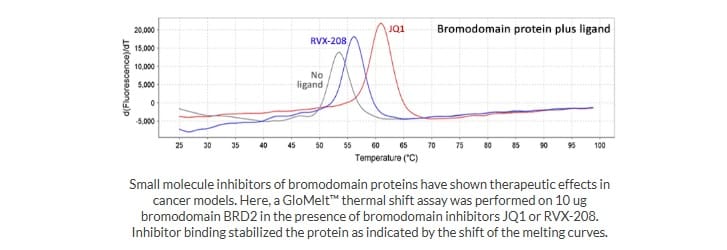
GloMelt™ Dye vs. Competitors
GloMelt™ dye has significant advantages over other environmentally sensitive dyes, such as SYPRO® Orange and PROTEOSTAT® TS dye. GloMelt™ dye generates a strong signal because it is optimized for detection in the SYBR® Green channel of qPCR instruments, and therefore low reaction volumes and low protein concentrations can be used. GloMelt™ dye is compatible with high concentrations of protein stabilizers (such as glycerol and sorbitol), and also protein destabilizers (such as DTT and imidazole). GloMelt™ dye performs very well in high detergent concentrations, unlike SYPRO® Orange. Another advantage is that ROX dye can be included with GloMelt™ dye during thermal shift assays, which improves results by increasing replicate consistency in PCR instruments that require ROX passive reference dye.
SYBR is a registered trademark of Thermo Fisher Scientific. Proteostat is a registered trademark of Enzo Life Sciences.
Resources
Supporting Documents:

